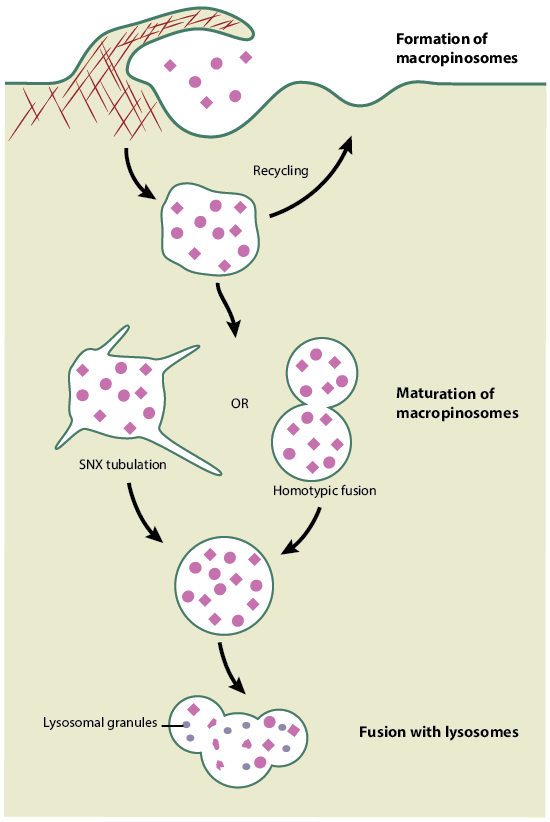Cancer is considered the second leading cause of death worldwide, first being cardiovascular diseases. According to the World Health Organization (WHO), one in 6 deaths is due to cancer. A major challenge in treating cancers is the ability of the tumor to develop resistance, becoming less susceptible to chemotherapeutic agents over time.
According to a study published in the journal Nature Communications, cancer cells may develop resistance by consuming dead cells through a process called macropinocytosis.
What is macropinocytosis?
Macropinocytosis is a form of endocytosis in which large particles, suspended in extracellular fluid, are brought into the cell by the invagination of the cell membrane. These large fluid-filled vesicles are called macropinosomes. According to previous studies, cancer cells use macropinocytosis to uptake amino acids.

Due to leaky blood vessels and inadequate blood supply, tumors tend to have a short supply of extracellular nutrients needed for cell proliferation and growth. Another challenge tumors face in their growth is anti-cancer agents that cause DNA damage. This leads to an increased demand for nucleotides for DNA repair. To overcome both these challenges, tumor cells tend to undergo necrocytosis, to obtain nutrients needed for growth.
Since despite these challenges cancer cells are able to obtain the nutrients needed for cell growth, they tend to become resistant to therapies targeting their growth and metabolism. Aggressive tumors of the pancreas, prostate, and breast seem to be the most prone to therapeutic resistance due to mutations that can cause macropinocytosis.
According to Prof. Aimee Edinger, “using this method of scavenging, cancer cells can obtain the amino acids, sugars, fatty acids and nucleotides they require to keep growing.”
By conducting a variety of tests in mice, the researchers at the University of California, Irvine, were able to demonstrate that by inhibiting the cell’s ability to consume dead cells, the effectiveness of anti-cancer drugs can be increased. Using click chemistry-based flux analysis, the researchers were able to confirm that macromolecules other than amino acids can be taken up by the cancer cells via necrocytosis.
The research offers an insight into the future of cancer therapies. The researchers believe that by combining radiation and chemotherapy with macropinocytosis inhibitors, the development of therapeutic resistance can be limited.
References:
Jayashankar, V., Edinger, A.L. Macropinocytosis confers resistance to therapies targeting cancer anabolism. Nat Commun11, 1121 (2020)
Housman, G.; Byler, S.; Heerboth, S.; Lapinska, K.; Longacre, M.; Snyder, N.; Sarkar, S. Drug Resistance in Cancer: An Overview. Cancers 2014, 6, 1769-1792.
Commisso C, Davidson SM, Soydaner-Azeloglu RG, Parker SJ, Kamphorst JJ, Hackett S, Grabocka E, Nofal M, Drebin JA, Thompson CB, Rabinowitz JD, Metallo CM, Vander Heiden MG, Bar-Sagi D. Macropinocytosis of protein is an amino acid supply route in Ras-transformed cells. Nature. 2013 May 30;497(7451):633-7.




